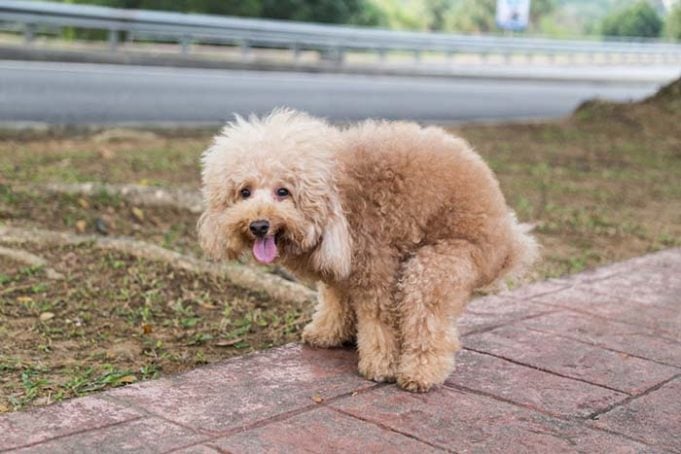When your dog is having trouble pooping, there can be a plethora of reasons why they are having problems. It's important to understand the main reasons why this happens not only so that you know what to do to properly take care of them but also if there is potential for an emergency.
In general, most dogs poop one to two times every day. If you notice that your pup has not pooped in a day or two, they may be constipated, have a blockage, or internal damage. Pay close attention to the symptoms that your pet is showing so that you know when you can try a home remedy versus seeking veterinary care. Your vet will be the best person to diagnose the reason for lack of pooping, and they will give the best advice on how to help treat that specific dog.
Symptoms
The symptoms that your pooch may show if they are experiencing constipation are very similar to if they have a bowel or stomach blockage or internal damage. You should monitor your dog for the following signs:
- Lack of pooping for more than two days
- Straining to poop
- Wincing, whimpering, or crying while pooping
- Dry, hard poop
- Pooping small, liquid stools with or without blood
- Tender or swollen abdomen
Your dog may experience one, or more than one, of the above symptoms. Once you understand the reasons for constipation, blockage, or internal damage and are certain that your pooch does not require emergency veterinary care, then you can try some of the suggested remedies.
Reasons
There are many different reasons why dogs have trouble pooping, including, but not limited to: constipation, blockage, or internal damage.
If your pup is constipated, the reasons may be:
- Too much or too little fiber in the diet
- Lack of exercise
- Medication side effects
- Dehydration
- Too much stress
One other reason the dog may experience constipation is their age. Older dogs who are less likely to get the exercise they need are more likely to suffer from constipation, whereas younger dogs with low exercise may not be as susceptible to constipation.
Blockages can also occur, which could then lead to constipation or lack of pooping. There are different reasons that blockages can occur, including:
- Excessive hair in the poop due to self-grooming
- Ingestion of a foreign object, such as rocks, dirt, leaves, or trash
- Matted hair from lack of grooming in the anal area
- Swollen or enlarged prostate or anal glands
- Tumors
If your dog is not experiencing constipation or a blockage from one of the lists above, they may have trouble pooping due to internal damage. Different types of physical damage to your pet that may cause issues include:
- Pelvic injury or trauma
- Spine disease or damage
- Orthopedic disorders
If the dog is in serious pain and may have physical damage, you must seek veterinary care immediately. Other reasons that you should seek veterinary care for a potential emergency are below.
Potential Emergency
If you suspect that your dog is experiencing physical trauma or has an internal blockage that is causing them not to be able to poop comfortably, then it is time to seek veterinary care. A vet will run the proper tests and give a thorough examination in order to properly diagnose your dog’s problem.
When constipation, blockages, or physical trauma are left untreated then bacteria and waste products can get taken up into the bloodstream, causing sepsis, a serious condition which could lead to a long hospital stay, or in the worst case, death.
Diagnosis and Remedies
If you decide that veterinary care is needed, your veterinarian will get your dog’s health history and symptoms, perform a physical examination, and may recommend additional testing. Additional testing may consist of blood tests, urinalysis, ultrasound, rectal exam and/or x-rays.
Depending on the results of the physical examination and tests the vet will offer you a proper diagnosis and potential remedies. Some remedies are more natural and less invasive than others, while some treatment may require medication, or even surgery.
The most common natural treatments that a veterinarian might recommend include:
- Increasing your dog’s exercise amount and quality
- Increasing your dog’s water intake
- Increasing your dog’s fiber intake (if your dog has too little fiber in their diet) by adding canned pumpkin, wheat bran, or a fiber supplement
- Decreasing your dog’s fiber intake (if your dog has too much fiber in their diet) by changing their dog food
Other treatments that a veterinarian might recommend include:
- Medication
- A stool softener
- Administering an in-office enema (do not try this at home – if done wrong it could cause injury, toxicity, or infection)
- Removal of blockage or impacted poop
- Surgery
- Repair of injury
If you think your dog is experiencing constipation because they have not pooped regularly in two days and they do not seem to be in pain, then you may want to start treating the constipation with a natural supplement such as pumpkin and increased hydration and more exercise. On the other hand, if your pet seems to be in pain then you should seek out veterinary care.
 When you visit the veterinarian, be sure to give them as much information about your dog’s health history as possible. Include the last time they pooped, if they are in pain or straining to poop, have any potential injuries, may have ingested something or could have a blockage. The vet may also want to know about any changes in the dog’s daily routine, changes in their diet, medication they are on, and any other symptoms they are exhibiting.
When you visit the veterinarian, be sure to give them as much information about your dog’s health history as possible. Include the last time they pooped, if they are in pain or straining to poop, have any potential injuries, may have ingested something or could have a blockage. The vet may also want to know about any changes in the dog’s daily routine, changes in their diet, medication they are on, and any other symptoms they are exhibiting.
Constipation in dogs is usually not of major concern, but it should not go left untreated. Sometimes constipation can be a symptom of another more serious problem that the dog is experiencing. Check with your vet if there is cause for concern to get a proper diagnosis and treatment options.
READ NEXT: 6 Reasons Why Your Dog Has Hard Poop and What to Do













